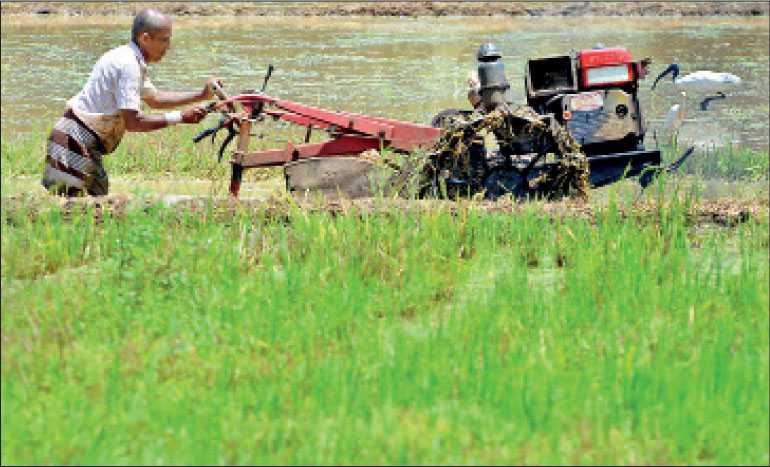Wednesday Feb 25, 2026
Wednesday Feb 25, 2026
Wednesday, 27 May 2020 00:00 - - {{hitsCtrl.values.hits}}

Sri Lanka has been one of the pioneers of irrigated agriculture and rain harvesting in the world – Pic by Shehan Gunasekara
By Dr. Tarek Kotb, Dr. Yasantha Maputana and Nilushana Sooriyaarachchi
 The devastating global corona pandemic has forced all countries to reorganise their priorities for all sectors of the economy, and the agricultural sector is no exception. The government of Sri Lanka has urged immediate action to control food safety and minimise the economic impact of the pandemic by banning imports of food, such as maize, rice, sugar, soya and flour based products, and called the Ministry of Agriculture (MoA) to compensate for the loss of these sources of nutrition.
The devastating global corona pandemic has forced all countries to reorganise their priorities for all sectors of the economy, and the agricultural sector is no exception. The government of Sri Lanka has urged immediate action to control food safety and minimise the economic impact of the pandemic by banning imports of food, such as maize, rice, sugar, soya and flour based products, and called the Ministry of Agriculture (MoA) to compensate for the loss of these sources of nutrition.
At the start of the COVID-19 crisis, the MoA launched an island-wide program to promote one million home gardens to minimise pressure on the immediate needs of vegetables. The program is designed to compensate for import-banned commodities and to identify an additional area of arable land to introduce these crops immediately during the YALA season.
Other special seed production program has also been designed to meet the seed needs of regular fields targeting the next MAHA season.
Several political decisions have also been taken by the government in favour of this initiative. The MoA invited development partners to support its new priority initiative in favour of food security, and the International Fund for Agricultural Development (IFAD), one of the specialised agencies of the United Nations, immediately responded to this request by repurposing the national ongoing project named the Smallholder Agribusiness Partnerships (SAPP) to support the whole agribusiness process, starting with the production of good quality seeds to linking producers to the market through effective partnerships established between small producers and private sector companies.
The SAPP has so far established 21 partnerships between small producers and private companies such as Cargills, Galoya Plantations, Hilton Colombo, Aruna Group of Companies and Ceylon Biscuits Limited, and many more. These partnerships aim to supply products to the local market and to export with dairy products, sugar, eggs, tea and value-added confectionery. In addition, the project actively promotes specialised value chains, including turmeric, peanut, cinnamon, tomato, pepper and some other traditional high value-added products such as traditional rice and value-added products to base of ‘Kithul’ (palm tree). While the SAPP approach was to develop commercial value chains, the pandemic with recent movement restrictions has obstructed the existing chains. SAPP responded by readjusting its approach to developing a ‘supply chain’ partnership rather than ‘value chain’, and repurpose the project to focus only on specific products that directly contribute to national food security with direct market links established by the Department of Agrarian Development (DAD) until the country’s lockdown is relaxed and private sector promoters become fully functional.
The National COVID-19 Response Program (CRP) is expected to cover 16 priority crops and IFAD has already committed $ 4.2 million to support producers of cowpea, maize, chillies and green gram. About 6,250 direct beneficiaries will benefit from this repurposing initiative. Currently, the country imports more than a quarter of the annual maize requirement and almost all dried chillies valued at $ 40 million and $ 68.7 million, respectively.
With the CRP, it is planned to expand the scope and pathways towards self-sufficiency of these two crops. Similarly, cowpea and green gram imports translate into a large annual import bill for the country of $ 6 million and $ 14 million respectively, which could be minimized by increasing local production by applying appropriate technology combined with financial assistance to small producers.
Two major seed production programs to meet trade restrictions are also being prepared with IFAD support for the implementation of $ 1.6 million and will support 1,390 direct beneficiaries; the chili seed production project plans to cover the seed needs of ‘dried chillies’ and the potato seed multiplication project which will be implemented in partnership with the Onesh Agri Ltd., which will assist small producers in technology transfer and commercialisation.
The digital platform to link value chain partners is also being adopted and tailor-made to serve remote beneficiaries in order to provide agricultural and agribusiness advice and help beneficiaries connected to local banks and markets. The SAPP is one of the main partners in developing a fully-fledged digital platform that the President of Sri Lanka announced as one of the most important tools to put in place for crisis management. As an example of the program’s immediate responses to the crisis as well as to the climate impact, IFAD is helping the MoA to develop proposals for ‘supply chain’ partnerships and to bring all stakeholders together through remote communication to allow the cultivation of target crops during the next YALA season.
Historically and with its above immediate response, IFAD has been a loyal partner of Sri Lanka for over 40 years and has always been at the forefront of developing the livelihoods of smallholder rural farmers in the country. In 2017, IFAD intervened to help people affected by the floods with the aim of reviving their agricultural activities with the design of a special loan program, ‘Post Economic Activity Recovery Scheme – PEARL’. IFAD has also supported households affected by the Tsunami at the beginning of this century; it has engaged in activities that go beyond its core competence – for instance, building houses for beneficiaries other than supporting income-generating and investment programs through microcredit.
Sri Lanka has been one of the pioneers of irrigated agriculture and rain harvesting in the world. It has presented a unique and highly efficient water management model for centuries known as the ‘Cascade Irrigation System’. This system successfully provided adequate water for the cultivation of paddy rice and other crops. With the effect of this during that period, the island nation was named ‘The Granary of the East’.
Perhaps the current global crisis will be an opportunity to restore the agricultural sector and put it in the production of food and clothing for the whole nation. The evolving modernised agricultural paradigm will introduce new mechanisms that take into account the true partnership between all stakeholders of the agricultural community and make advantage of modern agricultural techniques for increasing production, and information technology for remote support where possible to achieve an agricultural boom in food security for all Sri Lankans.
(Dr. Tarek Kotb is Country Director, IFAD, UN; Dr. Yasantha Maputana is Director, SAPP, MoA; Nilushana Sooriyaarachchi is Agribusiness Consultant, SAPP, MoA.)